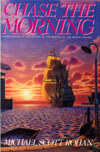
A fun novel, recommended to me by Bob Gore, who knew that I liked pirates (especially as seen in Tim Powers’ On Stranger Tides). Bob said that Chase the Morning wasn’t as good, and he was right, but it was still worth reading, and worth examining to discover why it isn’t as good.
First off, the story. Steve’s a hollow young urban professional in some modern European city in which the residents speak English, visit pubs, drive nifty sports cars fast, and engage in shipping and receiving. Steve decides to chase a whim one night and finds himself rescuing a dimunitive fellow from the intent of three dark fiends. No fantasy involved however. The dimunitive fellow is just a short guy, and the fiends are simple muggers. Wrong. These people were using swords. Steve tries to shrug off the incident, although it is the most exciting thing that has happened to him in quite a long time. And he can’t quite forget it, and finds himself again down by the shipyard. In no time, he finds himself involved completely, as he again saves the short guy’s life, watches some kind of voodoo creature escape from a bail of hay, and then has his secretary abducted by the fiends (the “wolves”).
It’s not On Stranger Tides or A.A. Attanasio’s Wyvern. There is a real sense of two different worlds colliding in Chase the Morning, rather than some alternate world (On Stranger Tides) or some new world that strangely resembles our own, but is consistent within itself (Wyvern). Chase the Morning is a fantasy novel in which someone from the real world finds fantastical things happening to them. This can be okay, except most readers are so familiar with the genre (which ranges from C.S. Lewis’ “Narnia,” to Stephen R. Donaldson’s “Thomas Covenant”), that the new author should know what’s been done. Rohan seems somewhat attune to the genre, but I think it’s obvious that he missed the Donaldson books in particular, and that his work suffers from it. In fact, trying to compare Chase the Morning with Lord Foul’s Bain better brings out the problems with Rohan’s book than trying to compare it with Powers, in which the only things really shared there is an idea of a milieu. That’s because Steve is supposed to be an anti-hero, like Donaldson’s Thomas Covenant. It’s tough to write a story in which your main protagonist is an anti-hero, because a reader’s first inclination is to identify with the protagonist of the story, especially in a field like fantasy, where the hero is often a thinly veiled wish fulfillment character of the reader (see Orson Scott Card’s widely successful “Ender” books for the clearest recent example of the same). Covenant works because he is an intensely unlikeable character; he is often so intensely unliked that readers can’t make it through the first part of Lord Foul’s Bain because they can’t, and don’t want to try to, understand Covenant. Donaldson overcomes the problem by allowing minor characters to become personifications of the reader: the mother of the girl he rapes in the third chapter (and who knows of his atrocity) takes Covenant to the lords not because of what he could mean to “the Land” but because she hopes that they will be able to punish him (which she is unable to do because of his “power”) or because she hopes that something good can become of his evil deed (that the lords can use him to save the Land). This is complex stuff for a fantasy novel.
Rohan’s Steve, on the other hand, is a likable character. Oh, sure, he’s described as hollow, but I think most readers wouldn’t necessarily find that a damning description. Steve’s unlikable traits are always described (told) to the reader; when the action gets going, Steve’s always doing the heroic thing (shown). The reader translates this as Steve’s the hero, so when the plot rolls around to using the fact that Steve’s a dweeb who is worthless as a human, the reader’s inclination is to say, “What?” So Chase the Morning is a flawed book. Rohan is someone with potential, though, because he realized that without the anti-hero idea, his novel was just another rehash of the same ol’ dropping the modern character in the fantasy world. That is, Rohan is at least trying to go beyond formula, and while he fails, one should applaud the effort.
[Finished 9 May 1993]
